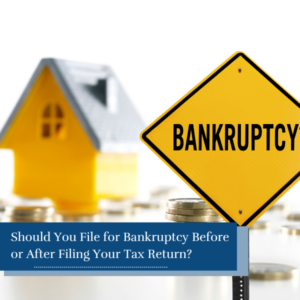Should You File for Bankruptcy Before or After Filing Your Tax Return?

Filing for bankruptcy can be a confusing process – as can filing your taxes. Combining the two can become even more complicated. Generally, but not always, it is better to complete your tax return before filing for bankruptcy.
The team at Sasser Law Firm has over 20 years of experience and has helped thousands of people in North Carolina navigate bankruptcy. We can answer questions you have about whether to spend your refund and explain the tax return requirements for Chapter 7 and Chapter 13 bankruptcy.
Bankruptcy After Tax Return – Should I Spend My Refund?
If you file chapter 7 bankruptcy prior to receipt of a refund and the refund is not exempt then upon receipt of the refund it should be held until the refund is either administered or abandoned by the chapter 7 trustee. If you think you will receive a non-exempt refund, then you may want to first file the tax return and deplete the refund in part of whole prior to filing for chapter 7. When it comes to exemption planning and pre-bankruptcy financial transactions it would be good to discuss your options with a bankruptcy attorney. This is especially true if the amount is large.
Filing Taxes Before, During, or After Chapter 7
In a Chapter 7 bankruptcy, a trustee is appointed. One of the primary responsibilities of the trustee is to administer the case which sometimes, but not often, involves liquidating non-exempt assets to distribute funds to creditors. A non-exempt asset can include the right to receive a tax refund.
Filing Taxes Before, During, or After Chapter 13
In a Chapter 13 bankruptcy, you have control over your assets and how you pay back your creditors. So you will not lose your tax refund but must disclose the right to receive the refund as part of your list of assets when the case is filed. The right to receive a refund on the filing date can impact how much you are required to pay back in chapter 13 because creditors must receive as much in chapter 13 as would have been received in chapter 7.
You must be current on the filing of tax returns before a plan can be confirmed. It is not necessary for all back tax returns to be filed prior to filing a bankruptcy petition. However, if the tax returns are not filed and are required to be filed then a chapter 13 plan may not be confirmed and the case will eventually be dismissed. Outstanding tax debts can be provided for in the chapter 13 plan. Often taxes that are not paid in full in a chapter 13 can be discharged so long as the tax return was timely filed more than 2 years prior to when the bankruptcy was filed. Income tax obligations that arose in the prior 3-4 years or income tax obligations where the assessment occurred in the 240 days prior to the bankruptcy being filed will have to be paid in full through the chapter 13 plan.
While the chapter 13 case is pending a debtor should file all required tax returns.
Contact Our North Carolina Bankruptcy Attorneys Now
If you live in the eastern half of North Carolina and are interested in filing for bankruptcy contact us at (919) 319-7400 or visit our contact page for a free consultation.
- About the Author
- Latest Posts
For more than 20 years, the Sasser Law Firm has been helping individuals and business owners sort through financial hardships to see the light at the end of the tunnel. Our North Carolina bankruptcy attorneys are all board-certified specialists, which means we have passed a complex exam, undergone a thorough peer review, and continue to earn legal education credits in this ever-evolving area of law.














